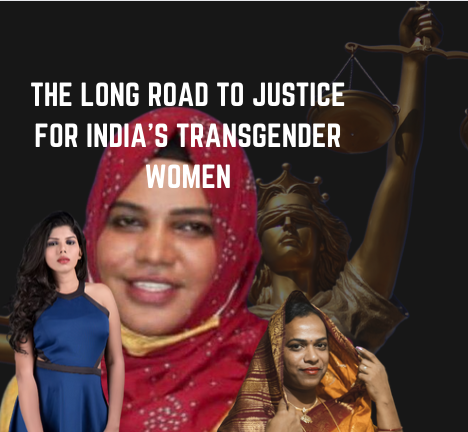When Rajan Nazran (explorer-in-chief and founder of The Global Indian Series) travelled to India to interview activist and actor, Rudrani Chhetri, two things struck him in particular: first, her sheer bravery in living as a woman in a society in which you are considered a pariah and second her tireless efforts to seek acceptance in India.

Ostracised, abused, mocked and even beaten, Rudrani’s life (and that of her fellow transgender women) is one of struggle and sorrow. On the second February came the news that Aneera Kabeer, a transgender teacher, attended her 14th job interview in two months wearing a cap, a mask that hid most of her face, and men's clothes.
The 35-year-old trans woman says she has been obliged to do so because transphobic remarks she has faced at earlier interviews. At length, she managed to secure a part-time post at a government school in Kerala. However, she claims that she just unfairly dismissed to months later. According to P Krishnan, a district official, said that the principal had informed him that Ms Kabeer hadn't been dismissed and had, instead, "misunderstood" the situation.
Mercy Killing
Quite where the truth lies is unclear. But the difficulties Kabeer and other trans women face in Indian are only too plain to see. Indeed, despairing of ever finding work, Ms. Kabeer sought legal aid in an attempt to petition for euthanasia. This was a drastic attempt and although she knew full fell that the courts would deny her ‘a mercy killing’ her cry for help would send a message about the plight of trans women on the Sub-Continent.
Her plan worked. The Kerala Minister for Education acted swiftly and found her job, at a Government Office, albeit a temporary one. Case closed?
Not a bit of it. Ms. Kabeer knew that her plea for euthanasia would force the hand of the Government.
The Example of Gandhi
When she embarked on this course of action, she thought of Gandhi who used the hunger strike as a non-violent political weapon. There is a great tradition of taking desperate measures in the pursuit of justice. In 2015, twenty protestors, from Gholgagon village along the Narmada river in Madhya Pradesh, took the unusual step of standing in waist-deep water for the better part of a month. Around 400 farmers' crop has been ruined, they say, after the government in April raised the water level of the Omkareshwar dam.
Equality before the Law
India is estimated to have some two million transgender people, though activists say the number is far higher. In 2014, India's Supreme Court ruled that they have the same rights as people of other genders. But the law and the truth on the ground are two very different things. Transgender people have to endure abuse and discrimination everyday at the hands of certain sections of Indian society. Violence is not uncommon.
The Problem Goes Deep
The law does not fix the underlying problem. It is at this point that many people say: “it’s all down to education or a lack of it. Educate the masses and all will be will.”
This may well have an effect in the long term, but it is regrettable that there is a minority of Indians to whom transgender people are second-class citizens. Surely, an adult who has the vote does not need to attar some class, to understand the difference between right and wrong. You might disagree with the very notion of self-identification, you may have a personal and private dictate for trans people, but to treat people so unkindly, to ostracise them, even to raise a hand to them is inexcusable.
Despite the firestorm on social media and elsewhere, self-identification causes, it seems not unreasonable to have concerns about the implications of self-identification. If a man can self-identify as a woman, many women are understandably afraid of allowing trans women into women-only spaces. No one is allowed to self-identify as married, or black as a citizen of a particular country.
These are all valid points and one should be able to make them without charges of ‘transphobia’ from the Thought Police.
The Law is Being flouted on an Epic Scale
However, the issue at stake here is the way in which trans people in India are discriminated against. India’s 2016 transgender law is frankly meaningless as indeed is the Supreme Court’s ruling of 2014, until attitudes change. It is plain to see transgenders do not enjoy the same rights as their fellow citizens and clearly the problem lies, not in the law, but in the hearts of minds of 1.6 billion Indians.
That many transgender people in India are forced to beg or become sex workers is an indictment on India, which after all is the world’s largest democracy.
It takes great courage to be a transgender person and it takes superhuman courage to make a stand on their behalf. Ms.Keeber tried in vain to be a man, which is what he family wanted. They urged her to join a gym, attend various courses, even take up smoking-in order make her less feminine. Highly educated (she has no fewer than three master degrees) and with a real aptitude for teaching, Ms. Keeber has been forced to apply for jobs for which she is over-qualified. For her teaching is a true vocation and yet she struggles to find acceptance.
Shanavi Ponnusamy

Nor is she alone. Take the case of Shanavi Ponnusamy who in 2018 to then Indian President, Ram Nath Kovind, begging him to euthanize her in the name of mercy. In 2017, after allegedly being turned down for a job as a stewardess for Air India on grounds of her chosen sex, she took her case to India’s Supreme Court. There the matter rested for months until Air India brought a case of ‘defamation’ against her. In its affidavit to the Supreme Court, Air India says Shanavi Ponnusamy’s ‘frivolous’ plea has harmed its reputation and affected its disinvestment bid. Despite the 2014 ruling that transgenders and eunuchs are to be recognised as a ‘third’ gender, Air India continues to recruit along traditional binary lines.
Frustrated at this state of affairs, Ms. Ponnusamy wrote to President Ram Nath Kovind and PM Narendra Modi seeking their intervention. PM Modi’s office responded, but only to inform her that Air India’s current policy had no place to accommodate a separate transgender category.
Although she lost her case, the affair served to highlight the plight of transgenders in India. That said, until people’s attitudes change, regrettably, stigma and discrimination are here to say for the foreseeable future.
-------------------------------











